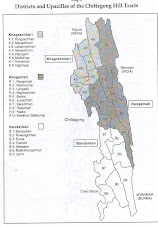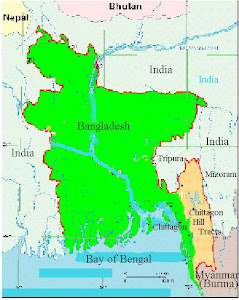Sajek, abode of Chakma, Tripura, Pankho and Lushai peoples is famous for beautiful blue mountains, highest altitude and high quality oranges, lies in the north eastern part of Rangamti Hill District of CHT, shares international border with Mizoram in the east and Tripura in the north through the famous Jompui Hill range of Mizoram and Tripura of India. Kaptai Lake looks like an egg from the highest Konglak peak (approximately 2,300 feet). The cultural uniqueness and exciting beauty of carpets of blue mountains and high hills make the area a heaven. It beckons many Jumma youths from other parts of plain CHT and increases their lamentation while they fail to visit her.
Chakmas are absolute majority while Lushai and Pankhos are most small with the households of 10 and 50 respectively and Tripuras have 300 families and Chakmas are 1,000 families in Sajek Union, a rough estimate claims. During Pakistan period the population of Lushai and Pankhos in Sajek was prominent. Unfortunately, now they form the smallest position in CHT for having a place of their peoples in India, a separate territory- Mizoram, a state upgraded from Union Territory through a peace deal with MNF president, Pu Laldenga, after an armed movement of about 22 years. 31 ethnic peoples of Mizoram are included in the “unified nation”- the Mizo Nation and Lushai and Pankhos are two of them.
Sudarshan Chakma, a PCJSS district committee member from Baghaichari Upazila claims this morning at my home that Sajek is heading towards a valley of sure death due to famine this year and this can be prevented if government and donor assistance reaches there in time. He tells- rodents now even have started attacking crops of valley lands and families of Upazila headquarters. Potato fields have been under recent attacks.
Sudarshan, 35 years, tells “I’ve even trapped 10 to 12 large size rats in a night, which I haven’t seen in my life.” He also tells me that recently he has narrowly escaped from a sure death as he was not aware of naked wire of his television’s AC cord on the back; the poly-coating has been bitten off by rodents and he caught it while he was putting the antenna jack on its socket. Sudarshan also tells that Mr. Nakul Bikash Chakma, Senior Staff Nurse, Baghaichari health complex was surprised finding the missing of about five kg of potatoes, all large sizes, from his vegetable basket at his kitchen, in a morning just one and a half month back. Nakul finally discovered some of the potatoes in a hole close to his home.
He further confirms me that the inhabitants of Sajek have been passing through a massive food crisis because of massive rodent attacks on all Jum crops. All most all the families have been starving and some can hardly manage one meal a day and it is even mixed with wild potatoes. They have collected some relief materials and sent those to Sajek mountain area.
Sajek, one of the most backward areas of Rangamati Hill District with the presence of all development indicators was without any road communication until last year. The road which is in progress now can be used during dry season and is partially operative by public transports- the “Chander Gadis”, goes through the Kassalong reserve forest, the last remaining rainforest in the CHT.
The PCJSS, all through its armed movement and parallel governance asked its supporters to help choose a non-Chakma candidate for the Union Parishad Chairmanship of Sajek Union and encouraged the non-Chakmas to have leaders of their own, based on the PCJSS policy towards ethnic minorities. This “reservation” is still alive and the Union is presently led by a Pankho while his predecessor was a Tripura.
Ms. Reneta Lok Dessallien, UNDP Resident Coordinator writes me that she had meeting with the western diplomats today and she would press them for additional support for negotiating the crisis. WFP is also seeking a buyer for its 6-month long food aid programme for the rodent hit people.
Barrister Raja Devasish Roy, Special Assistant to the Chief Adviser visits Sajek on 23rd to witness the rodent hit crisis. He will visit Ruilui and Konglak villages of Sajek mountain area. Very recently, his ministry allotted 700 and 500 metric tons of food grains purely for the rodent hit people of Rangamati and Bandarban Hill Districts respectively against Test Relief (food for works) programme.
Rupayan Dewan
Councillor, CHT Regional Council, Bangladesh
Phone: +880-351-63165
skip to main |
skip to sidebar


Map of Bangladesh

CHTs is number one Milliary zone in the world


Ministry of Chittagong Hill Tracts Affairs
The United Nation
The IJPMNA
This page provides information of the minority Indigenous Jumma Peoples in Chittagong Hill Tracts (CHTs) Bangladesh.
Contact with this please write:-ijpnusa@yahoo.com
Contact with this please write:-ijpnusa@yahoo.com
About Us
Location of Jummaland

Jumma Videos
- The BANDARBAN SADAR
- The Rowangchari
- The Ruma
- The Lama
- The Thanchi
- The Alikadom
- The Naikhkhongchari
- The RANGAMATI SADAR
- The Baghaichari
- The Langudu
- The Nanyachar
- The Barkal
- The Jurachari
- The Bilaichari
- The Kaptai
- The Rajsthali
- The Kawkhali
- The KHAGRACHARI SADAR
- The Manikchari
- The Laksmichari
- The Mahalchari
- The Matiranga
- The Ramgarh
- The Dighinala
- The Panchari
Audio & Video
Jumma Natok (Drama)
International Support
Educational Institution
Religious Organization
Buddhist Studies

Map of Bangladesh
Mission of Bangladesh
About Bangladesh
Bangali Audio Songs
Bengali News

CHTs is number one Milliary zone in the world
Online Audios
Refugee in Homeland

Jumma Picture

Blog Archive
About Me
- The Indigenous Jumma Peoples Movement in North America
- The Chittagong Hill Tracts (CHT) region comprises three districts: Banderban , Khagrachari and Rangamati. The districts comprise seven main valleys formed by the Feni, Karnafuli, Chengi, Myani, Kassalong, Sangu and Matamuhuri rivers aid their tributaries and numerous hills, ravines and cliffs covered with dense vegetation, which are in complete contrast to most other districts of Bangladesh, which consist mainly of alluvial lands. Geographically the CHT can be divided into two broad ecological zones: (a) hill valley, (b) agricultural plains. It is surrounded by the Indian states of Tripura on the north and Mizoram on the east, Myanmar on the south and east and Chittagong district on the west.
